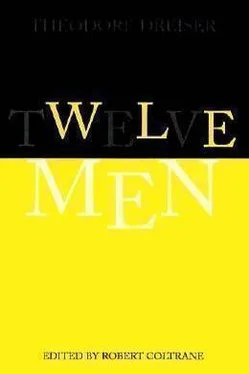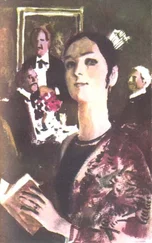Теодор Драйзер - Twelve Men
Здесь есть возможность читать онлайн «Теодор Драйзер - Twelve Men» весь текст электронной книги совершенно бесплатно (целиком полную версию без сокращений). В некоторых случаях можно слушать аудио, скачать через торрент в формате fb2 и присутствует краткое содержание. Год выпуска: 2014, Издательство: epubBooks Classics, Жанр: Биографии и Мемуары, на английском языке. Описание произведения, (предисловие) а так же отзывы посетителей доступны на портале библиотеки ЛибКат.
- Название:Twelve Men
- Автор:
- Издательство:epubBooks Classics
- Жанр:
- Год:2014
- ISBN:нет данных
- Рейтинг книги:4 / 5. Голосов: 1
-
Избранное:Добавить в избранное
- Отзывы:
-
Ваша оценка:
- 80
- 1
- 2
- 3
- 4
- 5
Twelve Men: краткое содержание, описание и аннотация
Предлагаем к чтению аннотацию, описание, краткое содержание или предисловие (зависит от того, что написал сам автор книги «Twelve Men»). Если вы не нашли необходимую информацию о книге — напишите в комментариях, мы постараемся отыскать её.
Twelve Men — читать онлайн бесплатно полную книгу (весь текст) целиком
Ниже представлен текст книги, разбитый по страницам. Система сохранения места последней прочитанной страницы, позволяет с удобством читать онлайн бесплатно книгу «Twelve Men», без необходимости каждый раз заново искать на чём Вы остановились. Поставьте закладку, и сможете в любой момент перейти на страницу, на которой закончили чтение.
Интервал:
Закладка:
"Jimmie!" shouted Rourke, leaping to the surface of the earth with a bound, "Jimmie! Now, be Jasus, where is that bla'guard Eyetalian? Didn't I tell him not to l'ave this place open!" and he began shoving the planks into place himself.
Jimmie, suddenly made aware of this new catastrophe, came running as fast as his short legs would carry him, scared almost out of his wits. He was as pale as a very dark and dirty Italian could be, and so wrought up that his facial expression changed involuntarily from moment to moment. Rourke was in a fairly murderous mood, only he was so excited and ashamed that he could not speak. Here was the supervisor, and here was himself, and conditions—necessity for order, etc.—would not permit him to kill the Italian in the former's presence. He could only choke and wait. To think that he should be made a mark of like this, and that in the face of his great supervisor! His face and neck were a beet–red, and his eyes flashed with anger. He merely glared at his recalcitrant henchman, as much as to say, "Wait!" When this train had departed and the dignified supervisor had been carried safely out of hearing he turned on Jimmie with all the fury of a masterful and excitable temper.
"So ye'll naht cover the hole, after me tellin' ye naht fifteen minutes ago, will ye?" he shouted. "Ye'll naht cover the hole! An' what'll ye be tellin' me ye was doin' now?"
"I carry da waut (water) for da concrete," pleaded Jimmie weakly.
"Waut fer the concrete," almost moaned Rourke, so great was his fury, his angry face shoved close to the Italian's own. "Waut fer the concrete, is it? It's a pity ye didn't fall into yer waut fer the concrete, ye damned nagur, an' drown! Waut fer the concrete, is it, an' me here, an' Mr. Mills steppin' off an' lookin' in on me, ye black–hearted son of a Eyetalian, ye! I'll waut fer the concrete ye! I'll crack yer blitherin' Eyetalian skull with a pick, I will! I'll chuck ye in yer waut fer the concrete till ye choke, ye flat–footed, leather–headed lunatic! I'll tache ye to waalk aaf an' l'ave the hole open, an' me in it. Now, be Jasus, get yer coat an' get out av this. Get—I'm tellin' ye! I'll have no more thruck with ye! I'll throuble no more with ye. Ye're no damned good. Out with ye! An' niver show me yer face again!" And he made a motion as if he would grab him and rend him limb from limb.
Jimmie, well aware of his dire position, was too clever, however, to let Rourke seize him. During all this conversation he had been slowly backing away, always safely beyond Rourke's reach, and now ran—an amazing feat for him. He had evidently been through many such scenes before. He retreated first behind the depot, and then when Rourke had gone to work once more down in his hole, came back and took a safe position on guard over the hitherto sadly neglected opening. When the next train came he was there to shove the boards over before it neared the station, and nothing more was said about the matter. Rourke did not appear to notice him. He did not even seem to see that he was there. The next morning, however, when the latter came to work as usual, it was, "Come, Matt! Come, Jimmie!" just as if nothing had happened. I was never more astonished in my life.
An incident, even more ridiculous, but illustrative of the atmosphere in which Rourke dwelt, occurred at Highbridge one frosty October Sunday morning, where because of seepage from a hill which threatened to undermine some tracks, Rourke was ordered to hurry and build a drain—a thing which, because the order came on Saturday afternoon, required Sunday labor, a most unusual thing in his case. But in spite of the order, Rourke, who was a good Catholic, felt impelled before coming to go to at least early mass, and in addition—a regular Sunday practice with him, I presume—to put on a long–skirted Prince Albert coat, which I had never seen before and which lent to his stocky figure some amusing lines. It was really too tight, having been worn, I presume, every Sunday regularly since his wedding day. In addition, he had donned a brown derby hat which, to me at least, gave him a most unfamiliar look.
I, being curious more than anything else and wishing to be out of doors as much as possible, also went up, arriving on the scene about nine. Rourke did not arrive until ten. In the meantime, I proceeded to build myself a fire on the dock, for we were alongside the Harlem River and a brisk wind was blowing. Then Rourke came, fresh from church, smiling and genial, in the most cheerful Sunday–go–to–meeting frame of mind, but plainly a little conscious of his grand garb.
"My," I said, surveying him, "you look fine. I never saw you dressed up before."
"L'ave aaf with yer taalk," he replied. "I know well enough how I look—good enough."
Then he bestirred himself about the task of examining what had been done so far. But I could see, in spite of all the busy assurance with which he worked, that he was still highly conscious of his clothes and a little disturbed by what I or others might think. His every–day garb plainly suited his mood much better.
Everything went smoothly until noon, not a cloud in the sky, when, looking across the tracks at that hour, I beheld coming toward us with more or less uncertain step another individual, stocky of figure and evidently bent on seeing Rourke—an Irishman as large as Rourke, younger, and, if anything, considerably coarser in fiber. He was very red–faced, smooth shaven, with a black derby hat pulled down over his eyes and wearing a somewhat faded tight–fitting brown suit. He was drunk, or nearly so, that was plain from the first. From the moment Rourke beheld him he seemed beside himself with anger or irritation. His expression changed completely and he began to swell, as was customary with him when he was angry, as though suffering from an internal eruption of some kind.
"The bla'guard!" I heard him mutter. "Now, be gob, what'll that felly be waantin'?" and then as the stranger drew nearer, "Who was it tould him I was here? Maybe some waan at the ahffice."
Regardless of his speculations on this score, the stranger picked his way across the tracks and came directly to him, his face and manner indicating no particularly friendly frame of mind.
"Maybe ye'll be lettin' me have that money now," he began instanter, and when Rourke made no reply, merely staring at him, he added, "I'll be waantin' to know now, when it is ye're goin' to give me the rest av me time fer that Scarborough job. I've been waitin' long enough."
Rourke stirred irritably and aggressively before he spoke. He seemed greatly put out, shamed, to think that the man should come here so, especially on this peaceful Sabbath morning.
"I've tould ye before," he replied defiantly after a time, "that ye've had aall ye earned, an' more. Ye left me without finishin' yer work, an' ye'll get no more time from me. If ye waant more, go down to the ahffice an' see if they'll give it to ye. I have no money fer ye here," and he resumed a comfortable position before the fire, his hands behind his back.
"It's siven dollars ye still owe me," returned the other, ignoring Rourke's reply, "an' I waant it now."
"Well, ye'll naht get it," replied my boss. "I've naathin' fer ye, I'm tellin' ye. I owe ye naathin'."
"Is that so?" returned the other. "Well, we'll see about that. Ye'll be after givin' it to me, er I'll get it out of ye somehow. It's naht goin' to be ch'ated out av me money I am."
"I'm owin' ye naathin'," insisted Rourke. "Ye may as well go away from here. Ye'll get naathin'. If ye waant anything more, go an' see the ahffice," and now he strode away to where the Italians were, ignoring the stranger completely and muttering something about his being drunk. The latter followed him, however, over to where he stood, and continued the dispute. Rourke ignored him as much as possible, only exclaiming once, "L'ave me be, man. Ye're drunk."
Читать дальшеИнтервал:
Закладка:
Похожие книги на «Twelve Men»
Представляем Вашему вниманию похожие книги на «Twelve Men» списком для выбора. Мы отобрали схожую по названию и смыслу литературу в надежде предоставить читателям больше вариантов отыскать новые, интересные, ещё непрочитанные произведения.
Обсуждение, отзывы о книге «Twelve Men» и просто собственные мнения читателей. Оставьте ваши комментарии, напишите, что Вы думаете о произведении, его смысле или главных героях. Укажите что конкретно понравилось, а что нет, и почему Вы так считаете.









